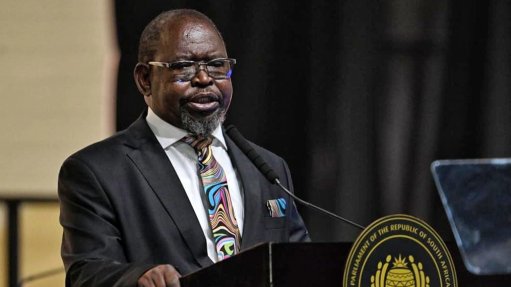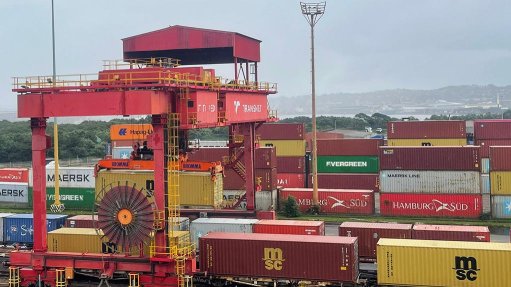Gauteng identified as a driver of low-carbon development
With Cabinet having approved the Just Energy Transition Implementation Plan in the week of November 21, Presidential Climate Commission (PCC) adaptation head Dhesigen Naidoo has confirmed that the commission will publish a 'State of Climate Action' report from next year, documenting what has actually been done.
Speaking at the Gauteng Climate Change Summit on November 23, he noted that among South Africa’s biggest concerns was rapid migration, with people finding it increasingly difficult to make a living in areas that were disproportionately impacted by extreme weather events such as droughts and floods.
Naidoo said the biggest inward migration province was Gauteng, including migration from outside and inside the country. He explained that if more extreme weather events such as hurricanes were to hit more African coastal countries, the migration numbers to Gauteng would likely increase further, since migration was often a direct consequence of climate change.
Migrants currently account for about 30% of Gauteng’s population. With the province already being densely populated, it makes the management of environmental and social issues even more challenging.
The International Organisation for Migration estimates that there will be two-billion people moving around the world in forced mobility mode on the back of environmental degradation by 2100.
Some of the climate challenges that South Africa will increasingly face are floods, droughts, high energy storm events, heatwaves, wildfires, biodiversity loss, progressive environmental degradation which impacts on soil structure and evaporation rates, and air quality and pollution.
Coupled with this were issues of violent extremism and conflict, which was already a reality of our time, Naidoo pointed out.
He mentioned that Africa was poised to experience a 4.7% loss of gross domestic product (GDP) in a below 2 ˚C global temperature increase scenario, 14% under a 2 ˚C increase scenario, 21.5% under a 2.6 ˚C increase scenario and 27.6% under a 3.2 ˚C increase scenario, which at the moment seemed the most likely.
Under this most extreme scenario, one-fifth of the region’s GDP would be lost, Naidoo stated.
With higher heat rates comes disease outbreaks, with malaria zones having particularly broadened in recent years, as well as other types of diseases. Noncommunicable diseases also become more prevalent when human bodies exceed a certain temperature, as do mental health issues.
Naidoo expects the societal fabric to change over concerns of resource scarcity, climate-derived poverty and the need to migrate.
There was also the additional issue of Gauteng’s economy being structured on fossil fuels and the issue of costs in dealing with disasters and keeping up with the rest of the world. “Move too fast and we leave people behind, but move too slowly and the whole country is left behind,” Naidoo said.
Diminishing supply chains for high-carbon products were already affecting Gauteng as the biggest exporting province in the country. Additionally, the $10-trillion of fossil fuel assets in Africa is money that is counted on for capitalisation, in the continental context.
Naidoo deemed it critical to see the opportunities inside the crisis that South Africa was in, with Gauteng having the unique opportunity to organise itself as a point of leadership on the economic, social and environmental aspects of the Just Energy Transition.
He said the province was already on a quest to lower its carbon budget and to do development with lower-carbon emissions in mind. Owing to Gauteng being so densely populated, it could be used as an asset rather than a liability, Naidoo explained, adding that the density ratio allowed a shorter pathway to scale up solutions.
Climate Change and Air Quality deputy director-general Maesela Kekana, on behalf of Forestry, Fisheries and the Environment Minister Barbara Creecy, said Gauteng had the opportunity to pioneer low-carbon development on a regional level and unlock business that low-carbon development offered.
Kekana added that Gauteng had been tasked with implementing economic diversification at scale, with a focus on working people and small businesses, including through investments in transport and renewable energy.
Creecy, as quoted by Kenana, believes climate-smart interventions represent lower risks and higher returns and should be enabled through concessional finance, scale and visionary leadership.
Additionally, she said multilateralism was critical to achieving global goals set out in the Paris Agreement.
A particular area of opportunity is that of electric mobility, Creecy highlighted, urging companies to invest in the electric vehicle supply chain and charging infrastructure.
She also expressed confidence that green hydrogen would facilitate decarbonisation in hard-to-abate sectors and unlock export potential for longer-term growth.
The Minister confirmed that there were important policy frameworks under development by the National Treasury with the purpose of building solid mechanisms for climate finance mobilisation and tracking.
These efforts will contribute to a reduction of financial risk through enhanced management of environmental performance.
“We know where we are coming from, where we are at and where we need to be, let us collaborate and get the job done,” Kekana said, concluding the Minister’s speech.
Article Enquiry
Email Article
Save Article
Feedback
To advertise email advertising@creamermedia.co.za or click here
Press Office
Announcements
What's On
Subscribe to improve your user experience...
Option 1 (equivalent of R125 a month):
Receive a weekly copy of Creamer Media's Engineering News & Mining Weekly magazine
(print copy for those in South Africa and e-magazine for those outside of South Africa)
Receive daily email newsletters
Access to full search results
Access archive of magazine back copies
Access to Projects in Progress
Access to ONE Research Report of your choice in PDF format
Option 2 (equivalent of R375 a month):
All benefits from Option 1
PLUS
Access to Creamer Media's Research Channel Africa for ALL Research Reports, in PDF format, on various industrial and mining sectors
including Electricity; Water; Energy Transition; Hydrogen; Roads, Rail and Ports; Coal; Gold; Platinum; Battery Metals; etc.
Already a subscriber?
Forgotten your password?
Receive weekly copy of Creamer Media's Engineering News & Mining Weekly magazine (print copy for those in South Africa and e-magazine for those outside of South Africa)
➕
Recieve daily email newsletters
➕
Access to full search results
➕
Access archive of magazine back copies
➕
Access to Projects in Progress
➕
Access to ONE Research Report of your choice in PDF format
RESEARCH CHANNEL AFRICA
R4500 (equivalent of R375 a month)
SUBSCRIBEAll benefits from Option 1
➕
Access to Creamer Media's Research Channel Africa for ALL Research Reports on various industrial and mining sectors, in PDF format, including on:
Electricity
➕
Water
➕
Energy Transition
➕
Hydrogen
➕
Roads, Rail and Ports
➕
Coal
➕
Gold
➕
Platinum
➕
Battery Metals
➕
etc.
Receive all benefits from Option 1 or Option 2 delivered to numerous people at your company
➕
Multiple User names and Passwords for simultaneous log-ins
➕
Intranet integration access to all in your organisation

















